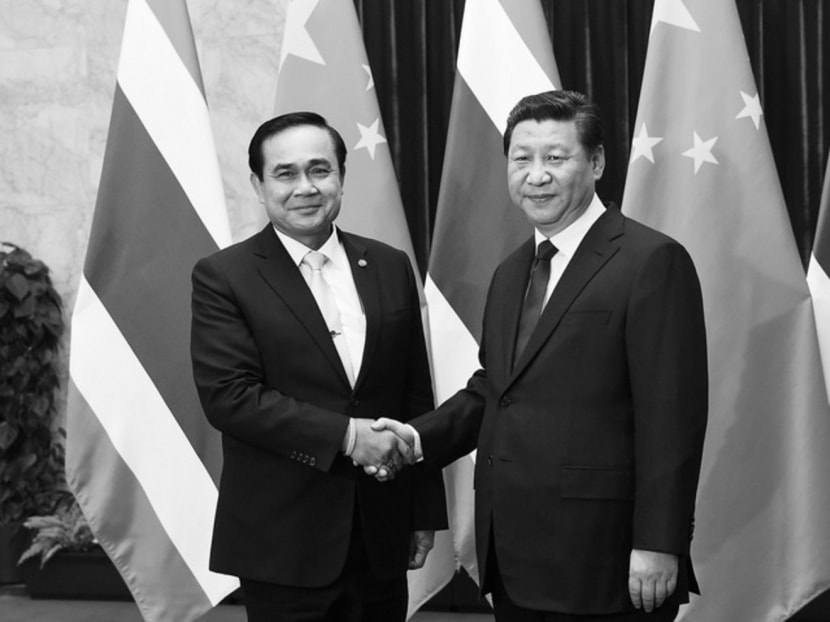Thai-China defence ties a marriage of convenience
As last year’s May 22 coup in Thailand has prompted the United States to turn a cold shoulder to the Prayuth Chan-ocha administration, Thailand and China have intensified their relationship in what is being called a marriage of convenience.

Thailand’s Prime Minister Prayuth Chan-ocha (left) with China’s President Xi Jinping in Beijing last December. Photo: Reuters
As last year’s May 22 coup in Thailand has prompted the United States to turn a cold shoulder to the Prayuth Chan-ocha administration, Thailand and China have intensified their relationship in what is being called a marriage of convenience.
Unlike Washington, Beijing has impressed Thailand’s military rulers with understanding and support. The South China Sea conflicts are the major reason China is seeking a closer friendship with Thailand.
The two countries kicked off a new era in their relationship with exchanges of visits between Thai Deputy Prime Minister Prawit Wongsuwan and his Chinese counterpart, who offered to sell arms to Thailand at special prices. Both sides are also looking at working together on military research and development programmes through the Thai Defence Technology Institute.
Apart from technical cooperation, both sides are taking part in joint exercises and contemplating military arms deals. General Prawit, in particular, backed a proposal by the Chinese government that both countries engage in a joint air exercise.
The first round of this exercise, which the two sides have talked about for years, took place last November, with four Chinese J-10 pilots learning to use the Thai air force’s Gripen jets.
In fact, the Thai air force’s decision to match China’s J-10 in the air exercise with Swedish-made Gripen, instead of its American-made F-16 jets, had sparked speculation Thailand did not want to upset the US.
However, sources said the decision was purely technical, as both the J-10 and Gripen belong to the so-called 4.5th generation of jets, while the F-16 is a fourth-generation jet.
During the next round of air drills scheduled for next month, the Thai air force will send two Gripen pilots from the Surat Thani-based Seventh Squadron to China to train on the J-10 aircraft. This follows visits by China’s August First squadron officers late last month after they attended the LIMA Air Show in Malaysia.
The air exercise is being done at a steady pace, partly because both sides must learn to eradicate language barriers. Eventually, the two air forces hope to establish a joint exercise under the code name Lightning Strike.
The army and the marines are also joining the push for joint exercises. The army initiated an annual exercise, code-named Strike, with each side taking turns as host, while the marines are to do a drill under the code name Blue Strike, which is scheduled to take place every two years.
Chinese leaders have insisted that the two nations have joint military drills, similar to the Thai-US Cobra Gold exercise. Some look forward to what could be dubbed Dragon Gold.
In addition to the military exercise, the two countries are expected to secure arms deals with each other. China is one of the three contenders proposing submarines for the navy, together with smaller ones from South Korea and Germany.
The committee considering the submarine purchase said it liked the look of the diesel-powered submarines from China, which cost 360 billion baht (S$15.1 billion) for two. The military is also eyeing L-15 fighter jets from China for training, which will replace the ageing L-39 fleet that has been in service for about 30 years. Other models being considered include the T-50 from South Korea, the M-346 from Italy, the Yak-30 from Russia and the Scorpion from the US.
It remains to be seen if the closer relationship with China will result in more Chinese weapons and military devices in service. BANGKOK POST
ABOUT THE AUTHOR:
Wassana Nanuam is a senior news reporter covering military affairs for the Bangkok Post.






